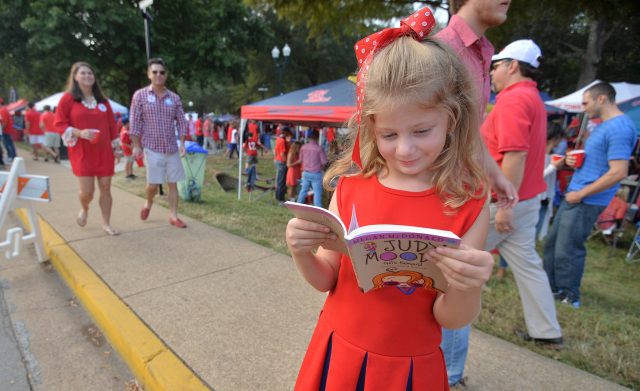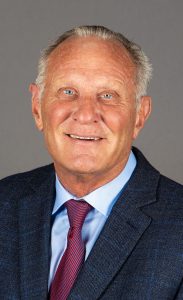
Patton Helveston reads a book in the Grove before an Ole Miss home football game. The North Mississippi Literacy Project, funded by Bob and Carol Dorsey, is helping improve literacy rates in the Oxford and Lafayette County school districts. Photo by Kevin Bain/Ole Miss Digital Imaging Services
OXFORD, Miss. – A three-year pilot program established in 2021 to improve literacy in the Oxford and Lafayette County school districts is proving so successful that its donors are fueling it with additional support.
Last year, a gift of almost $1 million from Bob Dorsey, a former University of Mississippi professor of economics, and his wife, Carol, helped kick-start the North Mississippi Literacy Project. The Dorseys recently increased their support with a $500,000 gift.
“We always hoped our first-year results would warrant funding for two more years,” Carol Dorsey said. “We are excited by the wonderful collaboration we saw at Lafayette Elementary and in the Oxford schools.
“Watching the teachers deliver this methodology in their classrooms and seeing the enthusiastic response from the students was thrilling. My respect for the creativity of teachers in the early grades is boundless.”
Formerly under the direction of the Grisham-McLean Institute for Public Service and Community Engagement, the program is supervised by the School of Applied Sciences.
Managing the program is the Shelton School a Dallas school that is the largest in the world for students with learning differences and a resource and teacher training center dedicated to making a difference by serving students who learn differently. The school has sent John Hodges, a certified academic language therapist and qualified instructor, to Oxford to direct the program.
If all continues as expected, the North Mississippi Literacy Project will make life easier for all children, especially children with learning differences.
Under Shelton’s guidance, the districts’ 130-plus teachers of pre-K through second-grade students have learned to use the multi-sensory structured language program “SEE,” or Sequential English Education. This method has been used to teach children to read, write and spell, providing a solid foundation for the development of literacy skills.
With the Dorseys’ support, the program can expand to include third graders who need reading help. The couple’s new gift will provide tools and resources that enable children to understand how words are put together.
“Students who learn differently due to challenges such as dyslexia can achieve even greater improvement by using the SEE method,” Carol Dorsey said.
“I’m so pleased by the way the administrators in both districts and the university have gotten behind this pilot program. If we are successful, we hope to see this approach replicated in other public schools.”
The program is especially important to the Dorseys, residents of Tucson, Arizona, because they watched how their late son, Adam, grappled with dyslexia.
“Having a child who struggled in school certainly made me realize that even the smartest kid can have a disability of some sort, a difference that singles them out,” Carol Dorsey said. “No matter how smart they are, they can’t learn like everybody else.
“Adam was very bright but he couldn’t see the way everyone else saw, so he couldn’t keep up in class. He did not learn to enjoy reading until he was about 25 years old. The miracle is that he earned a two-year degree at a community college and was able to find ways he could succeed, but it wasn’t through reading.
“Adam had to find his own ways of learning. It shouldn’t be so hard.”
About 30% of the populace learns differently, said Phillip Wiggins, founder and CEO of Stratford Land Co. in Dallas, whose three children attended the Shelton School to improve their reading skills.
The North Mississippi Literacy Project is the Ole Miss alumnus’ brainchild.
“When my oldest son, Davis, went to Shelton, he read in the 20th percentile in the nation,” said Wiggins, a 1977 graduate of the College of Liberal Arts and a Rebel tennis player.
“He was basically illiterate. He had no letter memory. Every time he saw a letter, he was seeing it for the first time.”
When Davis Wiggins left Shelton in the ninth grade to enter mainstream schools, his reading had improved to the 86th percentile. He went on to earn undergraduate and graduate degrees and works in the family business.
Having served as chair of the boards of directors for both the Shelton School and the McLean Institute for Public Service and Community Engagement, Phillip Wiggins recognized that Mississippi had limited options for illiterate children. And understanding that a student’s challenge can be due to processing, not intellect, he approached Joyce Pickering, Shelton’s executive director emerita, to gauge her interest in starting a literacy program in Mississippi using the proven SEE curriculum that she wrote.
The rest is history as the pieces of the pilot program simply fell into place.
The Dorseys’ gifts are already transformative, said Peter Grandjean, dean of the School of Applied Sciences.
“This is an amazing, life-changing opportunity that the Dorseys are providing young students,” he said. “Over 2,000 children are impacted directly by their commitment.
“In addition, I am excited about the training and experiential learning our students in communication sciences and disorders are receiving by working with the Shelton School and our local school districts.”
The North Mississippi Literacy Project is open to gifts from individuals and organizations. To contribute, send a check, with the project’s name written in the memo line, to the University of Mississippi Foundation, 406 University Ave., Oxford, MS 38655; or give online at https://give.olemiss.edu.
For more information on supporting the North Mississippi Literacy Project, contact Charlotte Parks, vice chancellor for development, at 662-915-3120 or cpparks@olemiss.edu.
